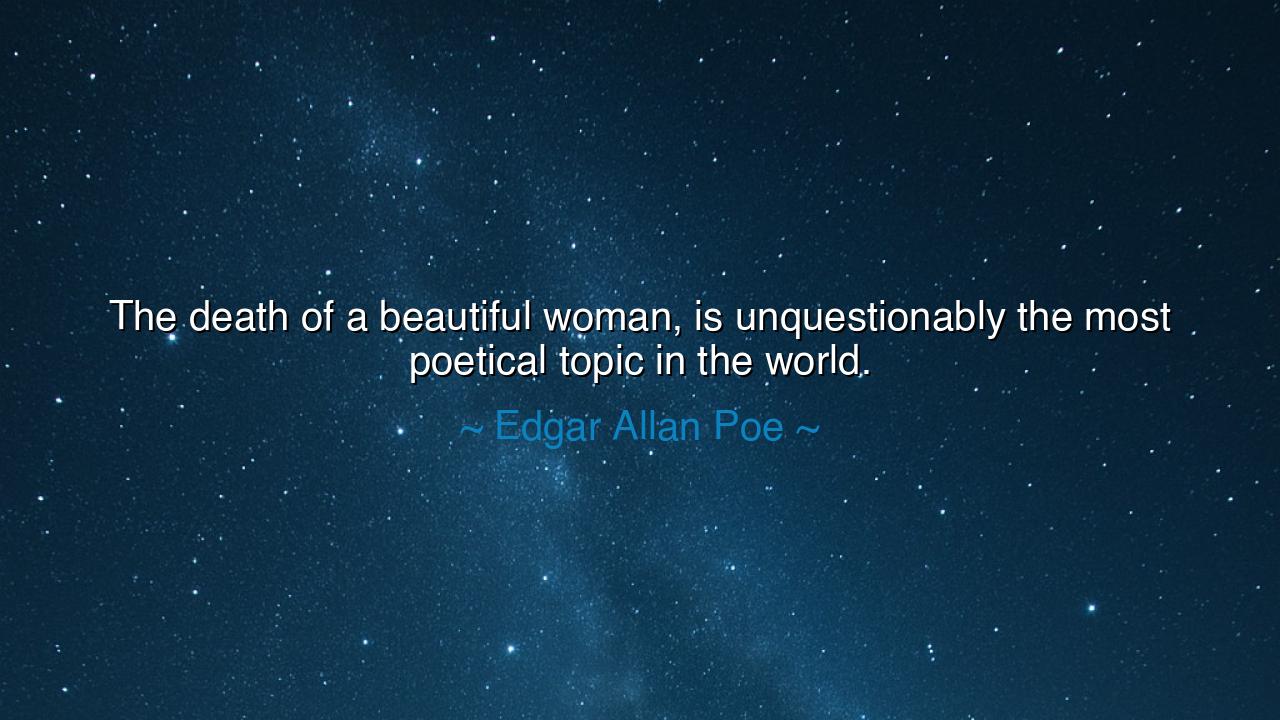
The death of a beautiful woman, is unquestionably the most
The death of a beautiful woman, is unquestionably the most poetical topic in the world.






“The death of a beautiful woman is unquestionably the most poetical topic in the world.” Thus spoke Edgar Allan Poe, the dark dreamer of American letters, whose pen drew beauty from sorrow and music from despair. These words, taken from his essay The Philosophy of Composition, are not mere provocation — they are a window into Poe’s understanding of art, of beauty, and of the fragile thread that binds love to loss. In them, he reveals his conviction that poetry is born from the meeting of beauty and death, that the highest emotion art can awaken is the trembling grief of something lovely lost forever.
To the ancients, beauty was a reflection of the divine, a brief manifestation of eternity in mortal form. To Poe, that beauty was at its most powerful when it was touched by mortality — when it perished, leaving behind only memory, song, and ache. The death of a beautiful woman, in his view, is the perfect symbol of this truth, for it combines the radiance of life’s most delicate creation with the inescapable shadow of its end. It is the ultimate paradox: that we weep most deeply for what was most beautiful, and that our tears, themselves, become the purest form of art. Thus, tragedy becomes sacred, and mourning becomes a kind of worship.
Poe himself was no stranger to loss. His life was a procession of graves — his parents dying when he was a child, his foster mother when he was young, and at last, his beloved wife Virginia Clemm, who wasted away before his eyes, pale and coughing blood, as he wrote by candlelight. Her slow death haunted his imagination, shaping the women who populate his poetry — Lenore, Annabel Lee, Ligeia — figures of ethereal beauty, lost too soon, forever mourned. In them, the poet turned personal anguish into universal art. To Poe, her death was not only his sorrow; it became the symbol of every love that perishes, of every perfection that time destroys. From his grief, he created a poetry of remembrance, where beauty does not fade, but becomes immortal in verse.
In writing that the death of a beautiful woman is the most poetic theme, Poe does not glorify death — he glorifies remembrance. For in art, death does not end beauty; it preserves it. The poet, the painter, the musician — all labor to hold the fleeting moment still, to make eternal what life allows only for an instant. It is as if every elegy, every lament, every song of lost love seeks to defy decay, to whisper against the silence: She is gone, but not forgotten. In that defiance lies the heart of poetry itself — the struggle to give immortality to what is doomed to die.
Consider the story of Dante Alighieri and his beloved Beatrice. She died when they were both young, yet her death became the flame that guided all his works. In The Divine Comedy, Beatrice is no longer merely a woman; she becomes the very symbol of divine grace, leading Dante through heaven itself. Her earthly death was the beginning of her eternal life in his art. So it is with Poe’s vision — that beauty, though slain by time, can be resurrected in imagination, purified and made eternal through the artist’s hand. Death, in this light, is not destruction, but transformation — the mortal passing into the immortal through the power of creation.
Yet, there is warning in Poe’s words as well. For to dwell too long in the worship of the dead is to risk losing one’s own vitality. Poe himself, ever haunted by the ghosts of his own making, wandered deeper into melancholy until it consumed him. Beauty’s death may inspire art, but it can also seduce the soul into obsession with sorrow. The ancients, too, knew this danger — that the poet who gazes too long into the abyss of loss may lose the strength to return. Thus, we must learn to honor beauty’s passing without allowing grief to eclipse the light that gave it life.
Lesson: Let us remember that all beauty is fragile, and that its impermanence is what makes it precious. To see beauty, love it, and lose it — this is the fate of every heart that lives fully. But let us, like Poe, transmute that pain into art, compassion, and reverence. Do not flee from loss, but let it teach you to cherish what remains. When something lovely fades, write, paint, sing — for in creation, the dead are not lost; they live again.
So, remember the wisdom of Edgar Allan Poe: that the deepest poetry springs from the union of love and mortality, that what breaks the heart can also open it. The death of beauty is not the end of meaning, but the beginning of immortality through remembrance. For as long as there are those who grieve, and those who create, beauty will never truly die — it will only change its form, living on in the hearts and words of those who dared to feel deeply, and to speak their sorrow into eternity.






AAdministratorAdministrator
Welcome, honored guests. Please leave a comment, we will respond soon